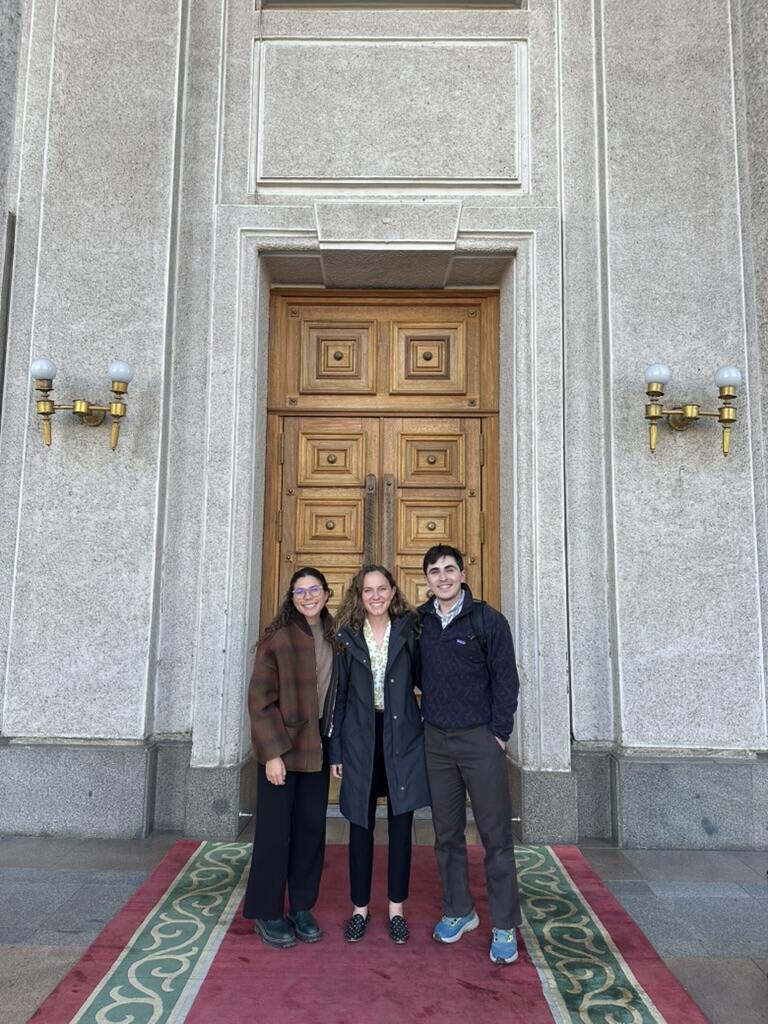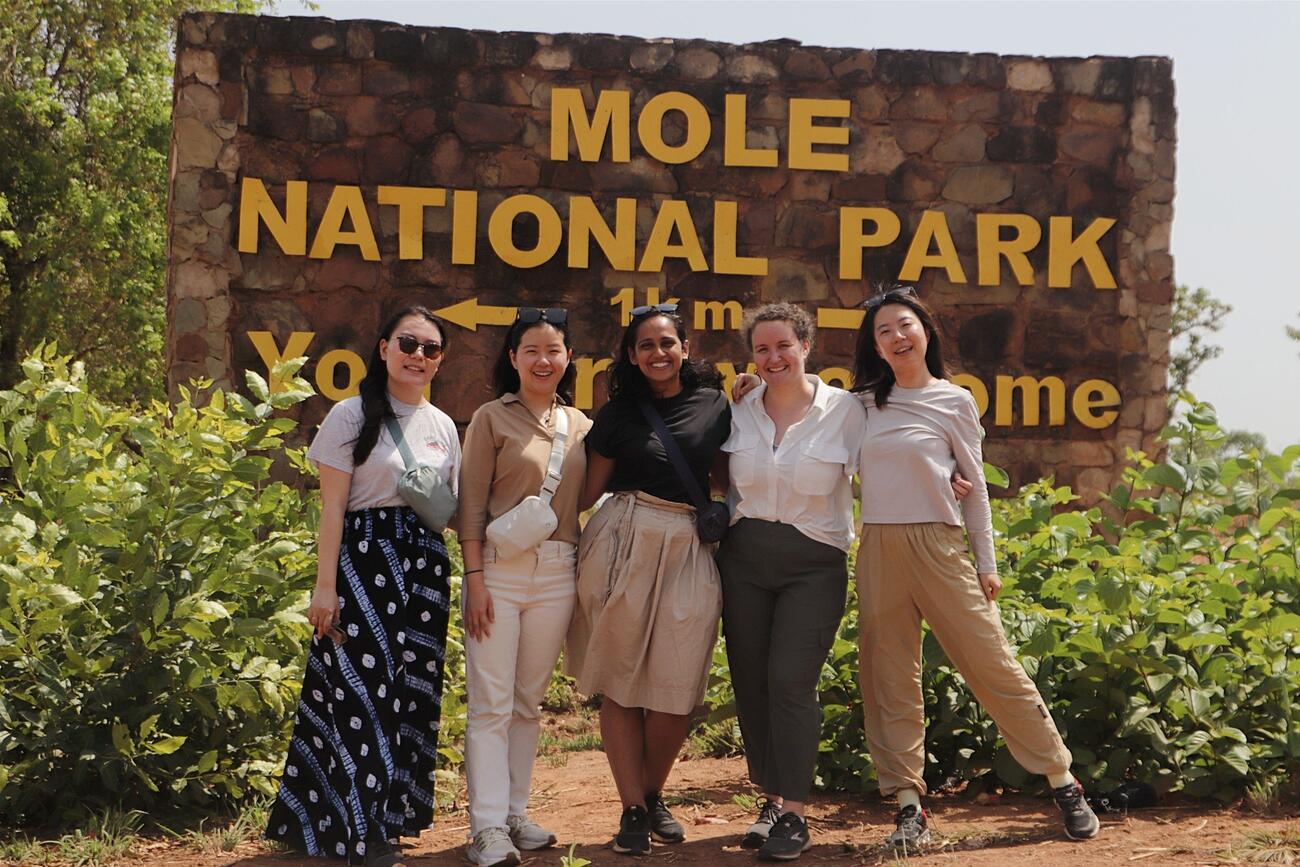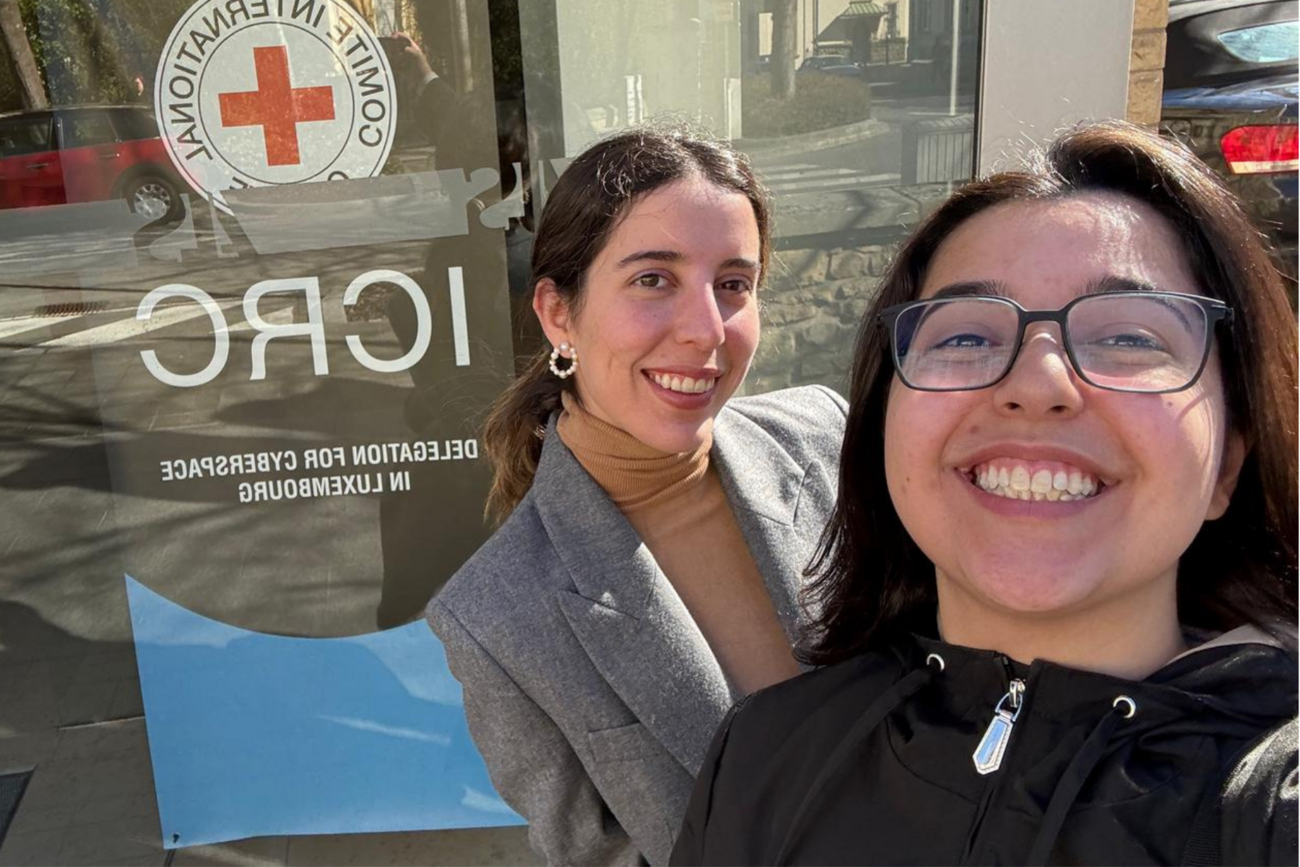Globe Trotting MIP Students Aim for Policy Impact
Globe Trotting MIP Students Aim for Policy Impact
Students from the Ford Dorsey Master's in International Policy Class of 2025 visited organizations around the world to tackle pressing policy challenges such as human trafficking, cyber threats, disinformation, and more.

It's NBA basketball playoff season, but the pros aren't the only ones taking their best shot this time of year. While teams hit the courts, students from the Ford Dorsey Master's in International Policy took to the air to gain hands-on policymaking experience for their final capstone projects.
The capstone project is the culminating experience of the Policy Change Studio, a two-quarter course that pairs groups of students with governments, NGOs, and research institutes around the world to practice crafting policy solutions that help local communities. In addition to learning the theory of policy, the Policy Change Studio allows students to gain experience with the realities of bureaucracy, resource constraints, and politics, and prepares them to be future leaders and decision-makers.
In Europe and Africa, Asia and the Indo-Pacific, read how our students are making policy slam dunks.
Mongolia
Julia Ilhardt, Serena Rivera-Korver, Johanna von der Leyen, and Michael Alisky worked with partners at GerHub in Ulaanbaatar, Mongolia, to examine infrastructure gaps, energy inefficiency issues, environmental, and other sustainable development challenges facing the ger districts.
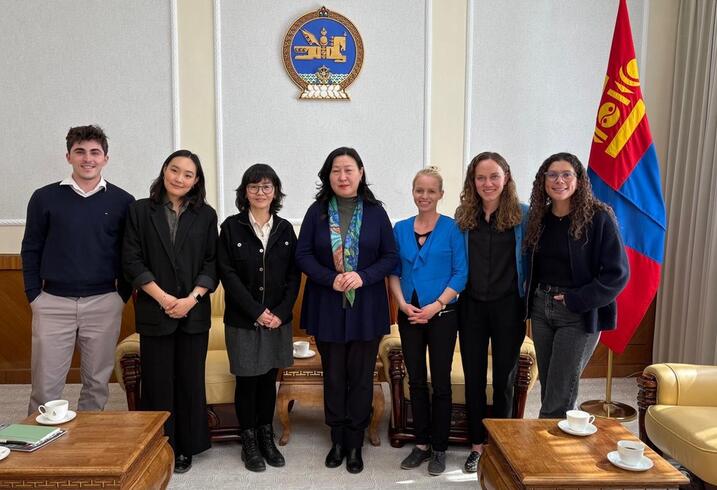




Our fieldwork provided firsthand insights into the complex sustainability challenges facing Ulaanbaatar's peri-urban residents, which make up 60% of the city's population. We interviewed community members, parliamentarians, think tank representatives, private sector actors, and local bureaucrats to learn about challenges related to urban governance and green urban planning, especially as they relate to the Office of the President's Billion Trees Initiative.
We learned that insufficient coordination between government agencies and a limited focus on evaluation and monitoring has downgraded the effectiveness of well-intentioned interventions. In other words, the strategy and planning is robust but implementation is treated as an afterthought. We're now considering ways for GerHub to expand its influence and funding pathways while still retaining its core strengths and organizational mission of improving the living conditions for ger district residents.
Ghana
Euysun Hwang, Leticia Lie, Sakeena Razick, and Julie Tamura traveled to Accra and Tamale, Ghana, to investigate the impact of disinformation on the country’s information ecosystem.

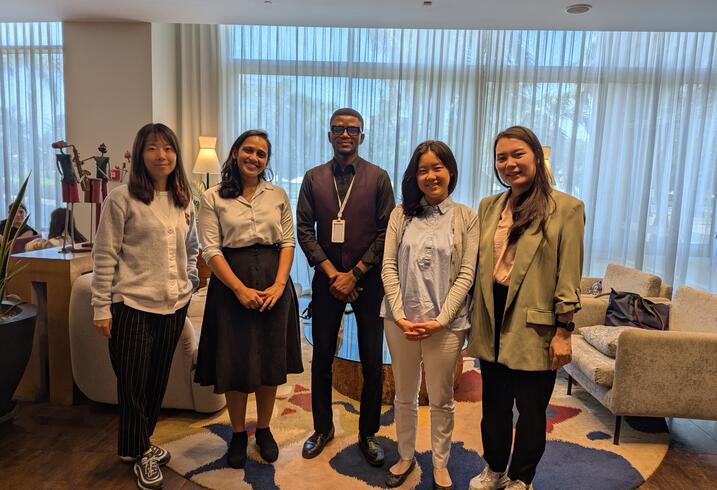



During our seven-day trip to Ghana, we were captivated by the country’s stunning landscapes, the warmth and diligence of its people, and the vibrant energy that filled the air. Our goal was to understand how coordinated influence operations are shaping public opinion and political discourse. Our visit to Northern Ghana revealed a political climate distinct from that of the South, a difference we discovered through conversations with local residents.
In Accra, we engaged with a diverse group of individuals — including a fact checking group, journalists, professors on communication, students from the University of Media, Arts and Communication, and an influencer — to discuss the challenges of political disinformation, the rationale behind it, and potential regulatory approaches. We gained valuable insight into the influential role content creators play as many people’s primary source of news and as shapers of public narratives.
These experiences underscored the urgent need for clear guidelines and a code of ethics to help influencers navigate what constitutes responsible and ethical conduct, given the significant responsibility they hold in shaping public understanding and disseminating information. We also had the opportunity to present our fieldwork findings to our partner organization, Africa Center for Strategic Studies, in Washington D.C., while enjoying the cherry blossoms along the way. During our trip, we also had the chance to enjoy the wilderness with elephants and reconnect with MIP alumna, Ibilola Owoyele!
Marco Baeza, Alex Bue, Rachel Desch, and Gene Kim conducted field research in Ghana, in both Accra and the Ashanti Region, on human trafficking linked to illegal artisanal and small‑scale mining (ASM).





Over an intensive week, we interviewed officials in the Ghana Police Service and Immigration Service, met with civil society organizations (CSOs) that run shelters and rescue operations, and saw several illicit artisanal and small-scale mining sites (ASM or “galamsey”) in the Ashanti region to observe working conditions and community dynamics. The trip revealed how entrenched political interests, corruption, and severe resource shortages hinder anti‑trafficking and anti-galamsey efforts far more than geography.
We were struck by the scarcity of shelters for survivors, CSO and government’s reliance on donor funding for resources, and the reluctance of various stakeholders to label labor exploitation in mining as trafficking, while acknowledging sexual exploitation around galamsey towns. Data on trafficking is difficult to acquire, yet actors welcomed the idea of technology‑driven mapping of illegal mine sites and better data collection. These insights will help us explore more nuanced solutions to address trafficking in illicit ASM operations, which we hope may be scalable to combating trafficking across multiple industries.
Australia
Gustavs Zilgalvis, Helen Phillips, Joe Wishart, and Samara Nassor traveled to Adelaide, Melbourne, and Sydney, Australia, to engage with space startups, range operators, regulators, and other stakeholders relevant to the operations and policies of returning in-space manufactured goods to Australia.





The team met with stakeholders from the Office of the Space Regulator in the Australian Space Agency, attended the Avalon Australian International Airshow and Defense Conference, and engaged with leading space startups. These meetings enabled the team to better understand the opportunity for Australia to accommodate the growing demand for reentries from the international space ecosystem. Given Australia’s optimal geographical location with low population density and minimal airline traffic overhead, its seamless licensing and regulatory regime, and geopolitical and economic stability, Australia is poised to be the global leader in reentries from space.
India
Sandeep Abraham and Kevin Klyman spoke with AI experts in Bengaluru, India to better understand the barriers facing India’s open source AI ecosystem and the opportunities that AI holds for India.





Our team met with developers, entrepreneurs, researchers, and educators, each of whom had a distinct perspective on how AI could transform India’s economy and/or present risks to vulnerable populations.
Our problem’s basic premise was that lack of access to affordable and scalable computational resources was the biggest barrier to the adoption of AI in India. However, our conversations yielded three surprising findings :
- India’s open source AI community has found creative solutions and workarounds to its compute limits, such as smaller or more efficient AI systems.
- Stakeholders saw open source AI as a poverty reduction problem (and opportunity).
- Despite global and domestic challenges, interviewees were unyieldingly optimistic about India’s future as an AI powerhouse.
As we experienced Bengaluru’s traffic, heat, language barriers — but also its dynamism, creativity, and joy as the Silicon Valley of India — we saw firsthand what a rich sandbox India was for explosive AI innovation.
Belgium
Emerson Johnston and Tiffany Saade traveled to Brussels, Luxembourg, and London to explore how NATO can strengthen cyber threat intelligence sharing among member states while navigating classification constraints, operational secrecy, and a persistent trust deficit.

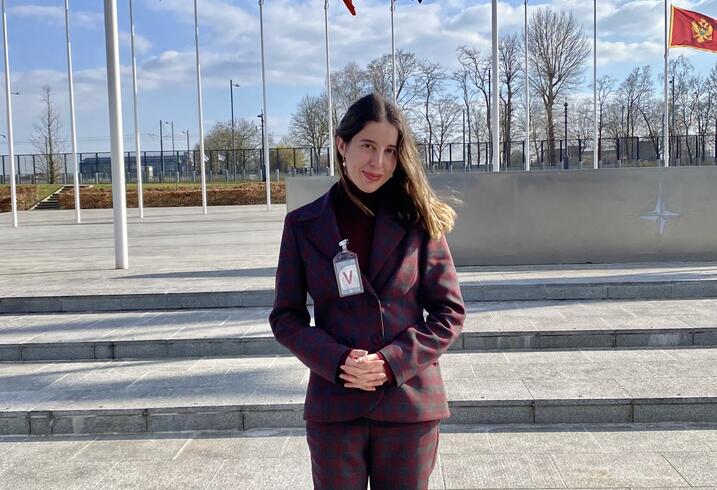



During our fieldwork trip to Brussels, Luxembourg, London, and Oxford, we met with a range of key stakeholders shaping cyber threat intelligence policy and practice, including NATO HQ officials, the ICRC cyber delegation, UN counterparts, the Luxembourg House of Cybersecurity, CIRCL, NC3, INTERPOL representatives, the World Economic Forum, the CyberPeace Institute, and academic experts from Oxford and ETH Zurich.
These conversations revealed a striking insight: cyber threat intelligence sharing is not primarily a technical challenge, but an intelligence and trust issue that is rooted in divergent national threat perceptions, disclosure hesitations, and institutional cultures. We were surprised by how differently “sharing” is conceptualized across institutions. Some see it as strategic alignment, others as transactional utility, but all acknowledge the urgent need for more resilient and transparent mechanisms. These insights will shape our project’s final recommendations, pushing us to think beyond interoperability and toward building incentives, shared standards, and norms that reflect both the sensitivities and necessities of cyber cooperation within NATO and beyond.
Our research will focus on bridging these gaps between national security priorities and alliance-wide risk management, analyzing how varying cyber capabilities and disclosure hesitations hinder meaningful collaboration. Ultimately, we aim to support NATO’s efforts to mitigate rampant offensive cyber risks and escalating security threats across the alliance.
The Ford Dorsey Master's in International Policy
Want to learn more? MIP holds admission events throughout the year, including graduate fairs and webinars, where you can meet our staff and ask questions about the program.



